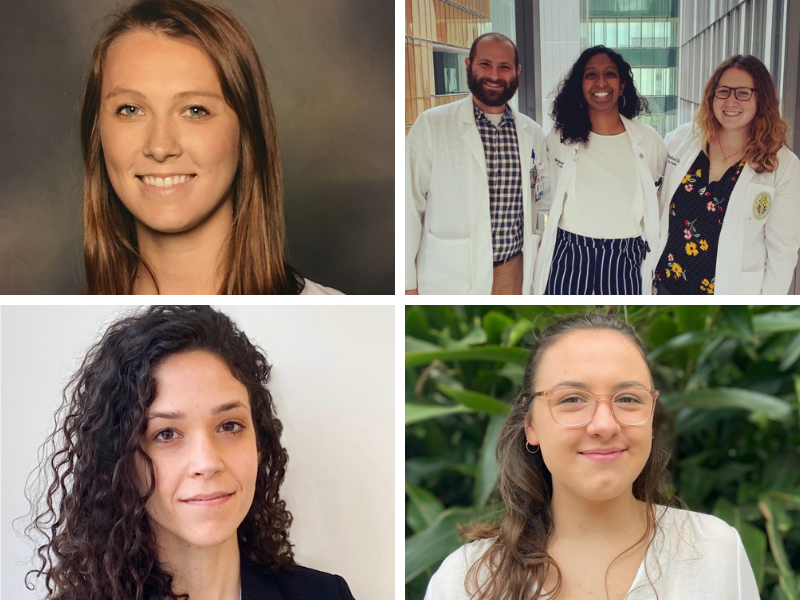This spring the Tulane MD/MPH Program placed and supported several students in COVID response projects at the DePaul Community Health Center. Mark Dal Corso, MD, MPH, associate professor of global community health and behavioral sciences at the School of Public Health and Tropical Medicine and a pediatrician at DePaul Community Health Center serves as the faculty director for the MD/MPH rotation. He helped students plan projects to help DePaul with their needs.
Callie Kennedy, analyzed the presenting symptoms of COVID-19-positive patients in the DePaul Community Health Center network.
At the time (early Spring 2020), the primary known symptoms of COVID-19 were cough, fever, and shortness of breath. Kennedy found that DePaul clinics patients were presenting with far more diverse symptoms, including muscle aches, headache, and loss of taste and/or smell.
She reviewed charts for more than 150 COVID-19 patients and developed a report summarizing presenting symptoms, in addition to noting other potentially pertinent patient demographics such as age, gender, race, and high-risk comorbidities. Her report summarized the findings and important public health implications from the data. She provided this summary to Dr. Robert Post, a medical director, to be disseminated across the clinic network. This information needed to be disseminated to make everyone working in the clinic network aware for screening purposes to ensure that any patient with viral illness symptoms be assumed COVID-19 positive until proven otherwise in the clinic networks approach to taking care of patients.
Mayanka Mahendran, a Tulane MD/MPH student in the Global Community Health and Behavioral Sciences Department, conducted her practicum remotely with a team of public health practitioners working with DePaul’s telehealth interface.
DePaul runs a number of health centers and due to the sudden outbreak of COVID-19, they were forced to switch from in-person visits to telehealth encounters in a short amount of time. This quick change came with hurdles including technological issues and challenges with patient communication. The team was asked to help with the transition and to ensure that patients using the telehealth interface experienced efficient and high-quality care. Her work was supervised by Dr. Alyssa Lederer, the program director for the Health Education and Communication MPH Program at Tulane.
She did a literature review focusing on the intersection of Telehealth with patient access, patient experience, and prior interventions within the field of telemedicine. This review was particularly focused on minority populations, as these populations tend to suffer more from disparities in healthcare that could be exacerbated with the switch to telemedicine. Mahendran’s review was summarized and analyzed in a report with recommendations for the direction of the project.
“COVID-19 took everyone by surprise, and it necessitated a huge shift from in-person clinic visits to online ones,” said Mahendran. “I was looking at previous instances of telehealth implementation to give DePaul some direction on how to make their interface more accessible and useful to patients and providers.”
Sarah Perou Hermans and Bridget Dixon both collaborated with DePaul to investigate how the mental health of patients has been impacted by the COVID-19 pandemic, and to assess related health disparities and social determinants of health.
Research has shown that the impacts of COVID-19 are not equivalent across all communities. Disease burden and health equity are influenced by social determinants of health such as neighborhood environment, housing, food access, support systems, and economic stability. Hermans and Dixon worked with Dr. Katherine Mills and DePaul to better understand how COVID-19 exacerbates social determinants of health and impacts community mental health.
The project consisted of contacting a randomized sample of patients from DePaul and conducting a phone survey to assess how patients have been affected by COVID-19. They were able to identify participants in need and connect them with resources at DePaul. Armed with this information, the organization is now better able to understand the characteristics of individuals whose wellbeing and mental health may be disproportionally affected by the coronavirus, and can assist with their future public health efforts and outreach related to the pandemic.
All of these projects were practicums, internships or work placement programs, for these students. The projects gave these students real-world experience, allowed them to apply the knowledge from their education to solve substantial problems, all while helping to minimize the impact of COVID-19 on the New Orleans area.

